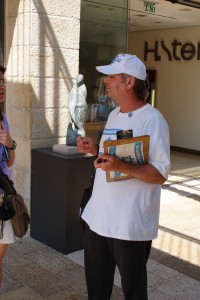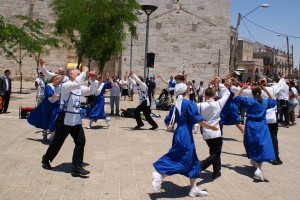The six-day curse
By Khaled Diab
Rather than an almost miraculous blessing, Israel's six-day victory in 1967 has proven to be a naksa for Israelis and Arabs alike.
Monday 6 June 2011
In the history of the Arab-Israeli conflict, there have been precious few win-win situations, and each side's victory is usually the other's loss; its joy, the other's grief. The most striking example is the dichotomy between the sorrowful Palestinian Nakba Day – which was marked, this year, by thousands of Palestinian refugees attempting to return symbolically to their abandoned homes – and Israel's Independence Day, with all its zealous flag-waving, partying and national joy.
Another notable example is the contrast between the nakba-rhyming naksa (or ‘setback'), which commemorates the Arabs' crushing defeat at the hands of Israel in June 1967, and Jerusalem Day, which celebrates Israel's stunning six-day victory and the ‘reunification' of the Holy City – although even among Israelis, Jerusalem Day is not much of a cause for celebration and “most people in Israel don't even know, and don't care, why it even exists”, according to Yossi Sarid.
“Jerusalem 2011 is a sad city pretending to be glad,” adds Sarid.

And the gladdest were the right-wing settler and religious Zionist movements. On 1 June, I came across hundreds of Israeli youths dressed in celebratory white shirts and matching kippahs streaming excitedly out of the city's Damascus Gate (Bab el-Khalil) in East Jerusalem, in unspoken defiance and insensitivity to the passers-by in this predominantly Palestinian section of the city.
In the Mamilla shopping arcade, just outside the old city's walls, an obsessive petitioner, who haunts shoppers at the mall on an apparently daily basis, didn't even take Jerusalem Day off from his quest to collect signatures to keep Jerusalem “united”. He implored shoppers and strollers to sign his petition urging the prime minister not to “divide” the city. Perhaps he'd mistaken Binyamin Netanyahu for some sort of closet peacenik who cared about international law and the rights of the Palestinians. He'd also obviously missed Bibi's reality-defying speech to the US Congress in which he said quite unequivocally: “Jerusalem must never again be divided. Jerusalem must remain the united capital of Israel”.
Inside the old town, near Zion Gate, a group of jubilant performers dressed up as Israeli flags danced the Horah, a circle dance originally imported from the Balkans by Romanian Jews which has become the quintessential folk dance in Israel and somewhat resembles maypole dancing, but without the pole.

Though the dance was well-choreographed and pleasant enough to behold and the joy of the dancers seemed genuine, what they were celebrating – the conquest of Jerusalem and the West Bank – made it seem like they were cheerfully running circles around the prospects of a peaceful resolution to the conflict, rather like the settlement ring around Jerusalem, and dancing on the grave of the peace process.
Other aspects of the Jerusalem Day celebrations were not as good-natured. For the first time, the focal point of the day's main event, the so-called Flag Dance, was provocatively the Sheikh Jarrah neighbourhood of East Jerusalem, where settlers have been making hostile inroads in recent years.
Tens of thousands of settlers marched from there, through Damascus Gate, finishing off at the Western Wall. During the procession, some marchers were witnessed chanting offensive slogans, including the worryingly violent “Death to leftists” and “Butcher the Arabs”, not to mention “Muhammad is dead” (which is something of a bizarre insult, considering that everyone knows that).
In many ways, Jerusalem Day is a poignant symbol of how Israel's 1967 victory was perhaps more of a naksa (setback) for Israelis – albeit a disguised one – than for Arabs, for whom it was an overwhelming defeat. Prior to the war, many Israelis saw their young state as militarily vulnerable, and this apprehension created a certain pragmatism in a number of Israeli circles about the need for peaceful coexistence.
This was perhaps best embodied in the views of Israel's second prime minister Moshe Sharett, who exchanged secret peace overtures with Egypt's Gamal Abdel-Nasser in the early 1950s. Unfortunately for posterity, these efforts were torpedoed by David Ben-Gurion, the Lavon Affair and the fact that the Egyptian leadership feared that the “Arab Street” was not yet willing to accommodate Israel.
The 1967 war bred a dangerous philosophy in Israel which blended unilateralism and militarism with complacency over the long-term consequences of continued occupation of large swathes of Arab land and exercising military control over the lives of millions of Arabs. This was perhaps the course of least resistance, considering Israel's fractured political landscape, which provides the ideal habitat for hawks to turn the doves into lame ducks.
Naturally, there were Israelis at the time who wanted to use the captured lands (with the notable exception of Jerusalem and much of the West Bank) as a bargaining chip towards a peace settlement with the country's Arab neighbours. But these voices were too few and too disorganised amid the euphoria and greed triggered by overwhelming victory and the apparent Arab intransigence signified by the famous “three nos” of the Arab League's Khartoum Resolution.
However, the well-organised and ideologically driven settler movement quickly moved to sideline these voices of reconciliation by establishing the first illegal settlements. While this was going on, Israel's political class was either happy to let them have their way or allowed themselves to be bullied and browbeaten into acquiescence.
In fact, Israel's “miraculous” military success also turned Religious Zionism, with its uncompromising attitude towards the conquered lands, especially the West Bank (which Israel officially calls Judea and Samaria), from a marginal movement and thrust it right into the Israeli mainstream.
Since then, the settler movement has worked hard to establish “facts on the ground” to guarantee the “integrity” of the “Land of Israel”. For example, the settler population has tripled since the launch of the Oslo peace process, thereby derailing the two-state solution by slicing up much of the land that was earmarked for the future Palestinian state.
Although the idea of “land for peace” emerged internationally in the wake of the war, as embodied in UN Security Council Resolution 242, many Israeli leaders have been motivated by an underlying assumption that, with time, military superiority could deliver both.
Meanwhile, the crushing defeat gradually led many Arabs and Palestinians to become far more realistic about the effectiveness of an armed solution to the conflict. Even the Khartoum Resolution, despite its rejectionist tone, recognised that diplomacy, not war, was the way forward.
The late Egyptian President Anwar el-Sadat was the first Arab leader to act openly on this philosophy. Even though he instigated the 1973 war, his aims were tactical: to readjust the military balance of power and force Israel to the negotiating table. Despite initial Arab hostility towards Sadat's peace overtures and their anger over Egypt's separate peace deal with Israel, not to mention Sadat's arrogant condescension and sidelining of the other Arabs, all the Arab states eventually accepted the premise openly. On a side note, one can only speculate about how much stronger Egypt's bargaining power would have been had the other Arabs presented a united front with, rather than against Egypt, and had Israel agreed to comprehensive rather than bilateral talks.
Today, Arab countries not only accept this principle but have offered Israel, through the Arab Peace Initiative, full recognition and normalisation in return for a complete withdrawal from the occupied territories (the West Bank, Gaza, East Jerusalem and the Golan Heights) and a “just settlement” of the Palestinian refugee crisis.
Despite this, Israel's leadership continues to procrastinate, preferring mushrooming settlements to a comprehensive settlement, apparently secure in the belief that military might will prove right in the end. But this sort of battlefield diplomacy is bound to fail and will lead to Israel living in a state of perpetual conflict which, though it may appear manageable today, could easily backfire in the future.
History has shown repeatedly that denying a people their rights cannot continue indefinitely, especially if the wave of change currently washing across the region inspires the Palestinians to mount a mass peaceful movement for their rights. Like the Arabs have learnt through bitter experience, Israelis may one day discover that what they reject today may seem like an unattainable dream in the future.
Ordinary Israelis need to wake up fast to how the settler movement has taken their collective fate, and that of their children and grandchildren, hostage and to mobilise en masse against the settlements while Israel is still in a position to do so. They should take to the streets and say clearly: “Yes to a comprehensive settlement. No to the comprehensive settlement of the West Bank and East Jerusalem.”
As in the story of Genesis which inspired the Israeli name for this war, many of the seeds of the current sorry state of affairs were planted in those six fateful days. It's time to bring about the dawn of the seventh day of justice and reconciliation. Only then can we all rest.


Diab was probably not alive in 1967, and is therefore does not remember the dramatic changes between Before and After. He is here wallowing in Arabist spin, which generally seeks to prove that up is down and down is over there somewhere. 1967 was 100% a good thing for Israel.
The Arab counter claims, that the 640AD conquest of Jerusalem is the real and eternal title-giver, that other peoples may rise and fall, but Arabs are forever, and that churlishness, denial, and violence are can’t-fail strategies for them, are a profound problem for the Arabs. For Israelis, Arab denial and perversity are only a management problem, an inconvenience, when they aren’t an opportunity to exploit.
Indeed, Zvi. Add to that that Israel’s greatest military setback (the 1973 war) occurred at a time when it controlled the greatest territory.
Israelis also seem to forget that their “greatest” military victory occurred when they did not control wide areas of land. It is worth noting that the original National Religious parties were actually rather pragmatic: http://en.wikipedia.org/wiki/National_Religious_Part
Via Facebook
There is no Arab-nationalist or Islamist state that has allowed any native Jewish or Christian population to live in peace. If Arabs stand for something other than ethnic cleansing, let them prove it on their territories. “Hand Israel over to us and we’ll prove it then”….not good enough.